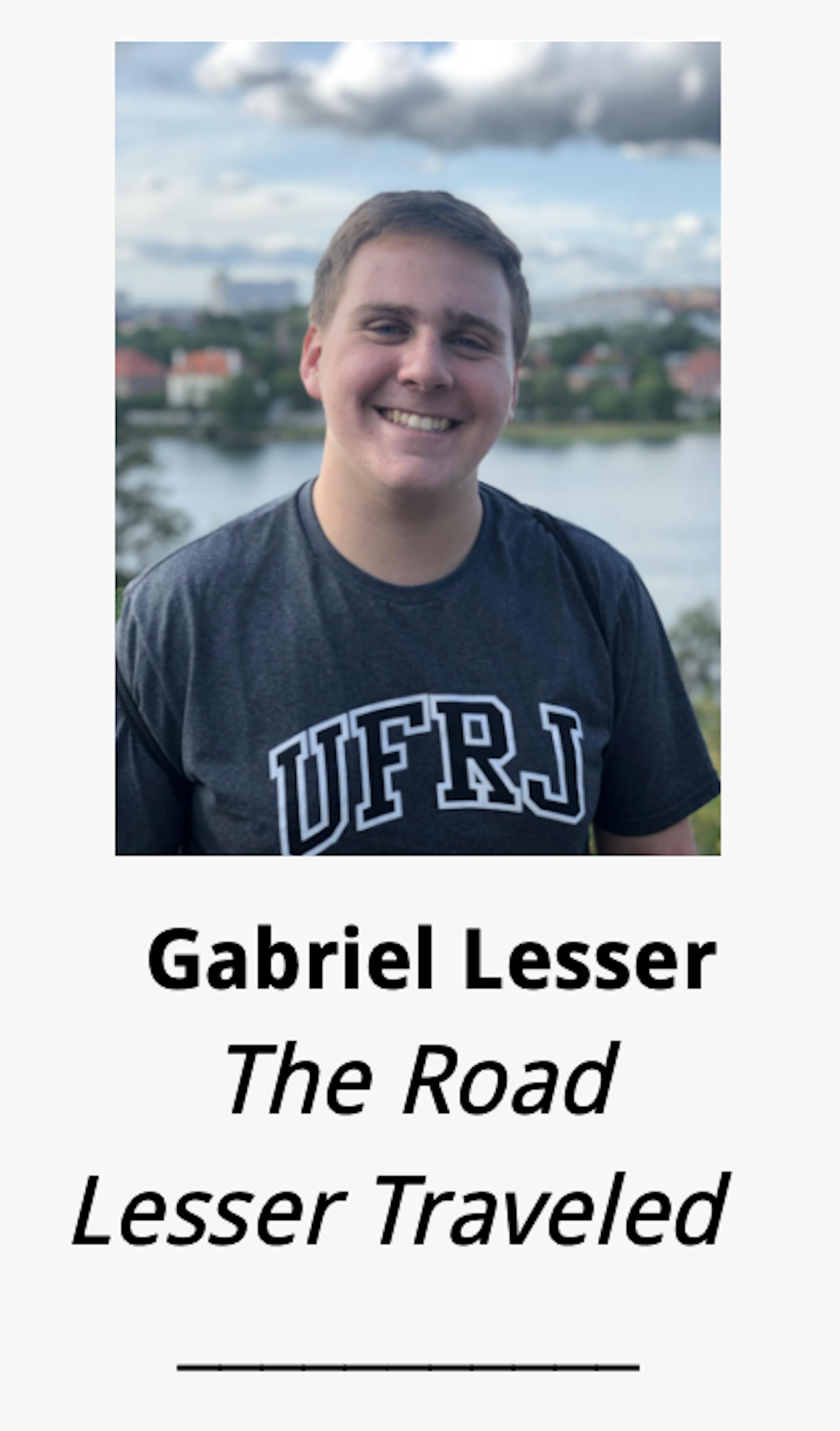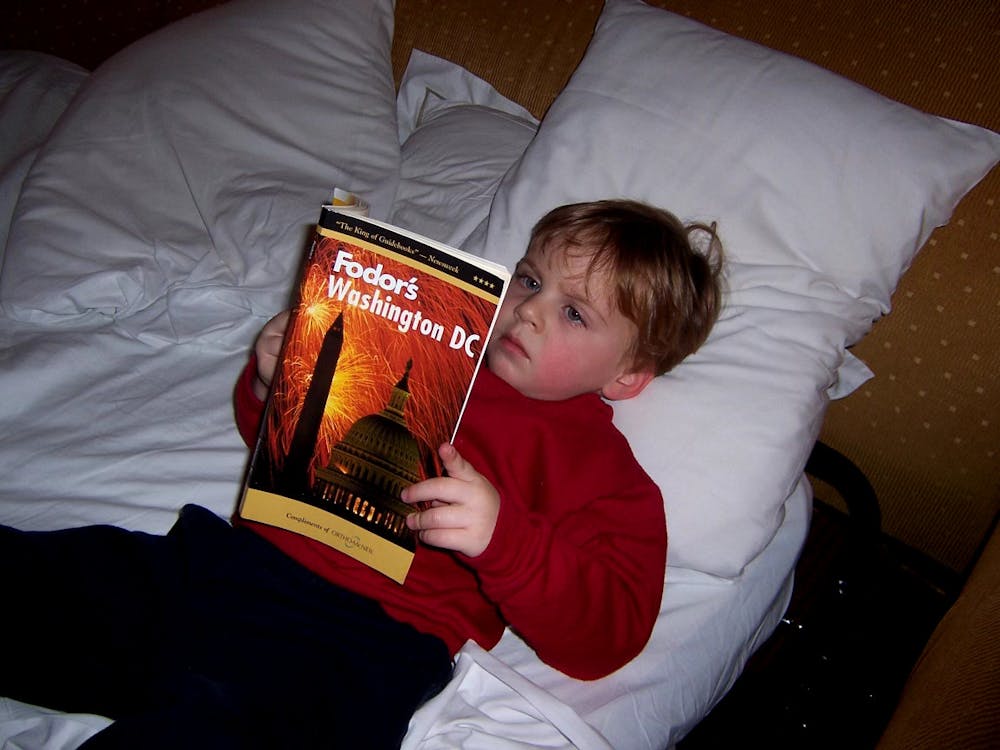
I recently stumbled upon a video of my 3-year-old self lying in bed, holding up a Fodor’s Washington, D.C. travel book with a confused look on my face. At the time, I couldn’t read yet, and I most definitely had not developed my passion for making travel itineraries, but I could pinpoint certain words and pictures that interested me. In the video, you can hear me excitedly yell, “I found the letter G! G is for Gabi...” in a barely coherent mix of English and Portuguese.
My parents named me Gabriel, after the angel, but for as long as I can remember, my family and friends have called me Gabi. Growing up, it was always interesting to introduce myself to the people around me; while my name and nickname are both common in Brazil and I could easily introduce myself as Gabi in Portuguese, people would often hesitate when I said my name here in the United States. As a child, I’d be hurt any time someone mispronounced or misspelled it as “Gabby” or asked me, “Isn’t that a girl’s name?”
As an impressionable and insecure elementary schooler, I started thinking that my name was a hassle to deal with, an embarrassing inconvenience that I should hide away and keep to my close friends and family. There came to be a certain point where my insecurities overcame me, and I began to introduce myself solely as Gabriel, which left my parents in total disbelief. As I got older and entered high school, Gabriel was often shortened to Gabe by my friends, peers and teachers, but I have always truly remained Gabi.
I look back at that same “G is for Gabi'' video, and I realize that my name hasn’t been the only aspect of my Brazilian American identity with which I have struggled to find balance. Watching the video, I notice the struggle for balance between English and Portuguese in my voice and how I would exhaustingly try to articulate my thoughts in a jumbled mix of the two languages.
Reflecting on the way I spoke brings back memories of when I would see speech and language therapists in both the U.S. and Brazil. I vividly remember sitting at the table, practicing my open vowels and learning that the “L” sound is generated when your tongue touches the roof of your mouth.
I look back at these memories and remember the struggle of learning how to properly pronounce certain phonemes in both languages. Yet, at the same time, I reflect with gratitude on how this truly improved my speech and how it helped me garner a passion for the details and intricacies of language.
I am forever indebted to my parents for raising me to be bilingual, for putting me in school in Brazil over the summers and for exposing me to language in every sphere of my life. It has truly helped me develop a passion for learning new languages like Spanish and French throughout my adolescence. While I cherish my language fluency, I also recognize that I have an implicit advantage in English for having been raised in the United States.
When I would visit my family in Brazil over the summers, I was constantly reminded that I didn’t know the latest slang or societal trends. I remember one time in particular when I was 8 years old and introducing myself to another kid at our camp in Rio. After saying hello, their response was, “Oh, you speak differently than us.” I remember feeling so exposed, as if my lungs were sinking deep into my stomach. I didn’t want to “speak differently” or have an accent, and I remember feeling so self-conscious of my voice for the duration of the camp.
A few years later, I recall having a conversation with my mom about accents, where she told me that despite having moved to the U.S. decades ago, people would still point out aspects of her accent in English. This surprised me, because I’d never considered my mom as having an accent in the first place. When I asked her if this attention to her accent bothered her, she responded by saying, “No, my accent makes me unique...it makes me who I am, and there’s really nothing I can do about it.”
I have now come to terms with the complexity of language and how we cannot control every aspect of it. I smile and accept the compliment any time someone says I speak Portuguese like a natural Carioca, but I also recognize that it is a very challenging task to speak fully authentically when I don’t live in Rio throughout the entire year. My mom’s words truly resonated with me and, they have helped me not only build confidence in the way I speak but also embrace the fact that my Portuguese is one of a kind.
Unlike my younger self, I no longer feel any shame for my Portuguese being considered “different,“ nor do I feel any embarrassment toward my name anymore. I love my name. I'm proud of my name. And my name tells a story. My name and my language are aspects of my identity that make me authentically me. G is for Gabi, and Gabi is who I am.
Gabriel Lesser is a freshman from Westchester, N.Y. studying Neuroscience and Romance Languages. His column explores his memories along with his current reflections and the lessons that he has learned.





